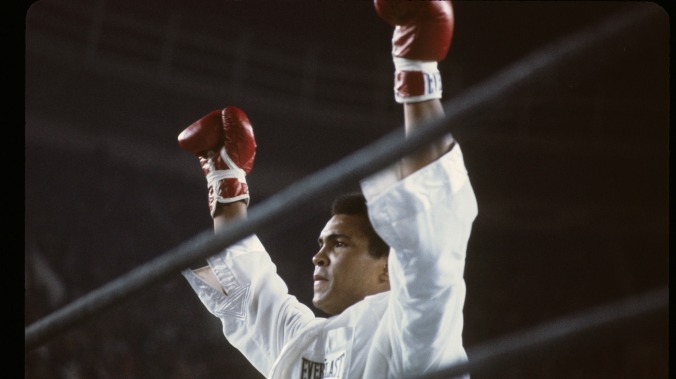Documentaries about Muhammad Ali aren’t exactly in short supply. The boxer’s life and career have been examined from dozen of angles since his rise to fame: A.K.A. Muhammad Ali came out way back in 1970, when he was still in the thick of it. Facing Ali, from 2009, tells Ali’s story from the perspective of the fighters who faced him. Best Documentary Oscar winner When We Were Kings zooms in on one specific fight and the politics surrounding it, 1974’s “Rumble In The Jungle” pitting Ali against George Foreman. I Am Ali, from 2014, uses audio recordings Ali made of himself as its hook. His story has been told and re-told.
And yet, unsurprisingly, there’s still plenty more to say. Ali’s life was so outsized and incredible that every new angle from which it’s dissected yields something new. In What’s My Name: Muhammad Ali, director Antoine Fuqua (Training Day) chooses to let Ali tell his own story through interviews, fight footage, and home movies from throughout the champ’s life. There’s no voice-over, no talking heads, and no new interview footage whatsoever, which frees this 165-minute film—delivered by HBO, for no clear reason, in two parts that will air back to back—to let Ali and his history speak for themselves.
Watching Muhammad Ali talk could be just as fun and engrossing as watching him fight, and often more so—each contributed equally to his celebrity. What’s My Name shows Ali grow from a shy Olympic medalist to a trash talker par excellence in no time—inspired, as Ali tells it, by the wrestler Gorgeous George. Ali knew early on that he could box, and he knew almost as quickly that if he made his bouts seem personal by insulting his opponents, people would be all the more excited to see him. At first, he was hated for his arrogance and his poetry, but as he says in an interview here, “Boo, scream, yell, throw peanuts—do whatever you do. But pay to get in.”
But if he had only been an overly confident loudmouth, his legend wouldn’t have grown as it did: It wasn’t long into his career that Ali took a turn toward activism, befriending Malcolm X and joining the Nation of Islam. Ali’s refusal to be drafted into Vietnam isn’t given tons of screentime here, but Fuqua did dig up some amazing footage of other black athletes—including Jackie Robinson—criticizing Ali for his political stances. But Ali was a man of integrity and assuredness, and he could articulate his points of view with such wit and brevity that it was impossible to argue with him. And few people wanted to, because not only was he incredibly charming, he was also, for a time, the greatest boxer in the world.
And that’s really where What’s My Name spends most of its time—in the ring. There’s little to nothing about Ali’s complicated family life or his consistent difficulties with money. (For a bruisingly complete picture, check out Jonathan Eig’s recent biography.) But his fights are covered spectacularly: Fuqua uses new music to provide tension, and he strategically mixes old footage—often grainy—with still photos, sharp and gorgeous. Practically the only new onscreen graphic in What’s My Name is a running tally of Ali’s wins and losses. (Spoiler: He lost some fights, especially toward the end.)
Along with the bouts themselves, interviews abound, from Dick Cavett to smaller shows to those incredible press conferences in which Ali rarely failed to jump from his chair and smack-talk his opponent. You could argue that many of those were done for show—and to goose ticket sales—but the footage of Ali with Ernie Terrell offers a tense snapshot of the time. When Terrell tauntingly refers to Ali as Cassius Clay—his birth name, which he changed after converting to Islam—Ali calls him an Uncle Tom, and tells the cameras that he’s going to “whip him until he says Muhammad Ali.” It’s from their fight that What’s My Name takes its name. You can see and even occasionally hear Ali yelling at Terrell as he delivers a savage beating, “What’s my name?”
With Ali’s later ascension to hero status, it’s easy to forget what a difficult path he had to forge, and what resistance his fights for equality were met with. By stripping most of the standard documentary crutches from his version of the story, Fuqua lays it all bare, and the resulting portrait is vividly detailed even as it’s understandably incomplete. But that’s a small problem considering that covering Ali from every angle would require many more hours than the three-ish that Fuqua had here—and considering there are so many other docs out there to fill in the gaps.












![HBO teases new Euphoria, Larry David, and much more in 2026 sizzle reel [Updated]](https://img.pastemagazine.com/wp-content/avuploads/2025/12/12100344/MixCollage-12-Dec-2025-09-56-AM-9137.jpg)




























